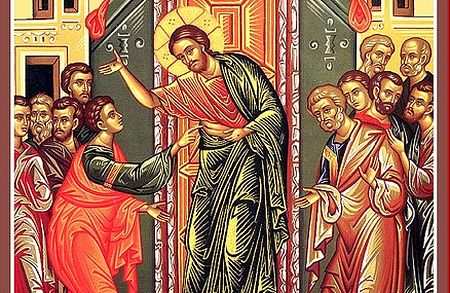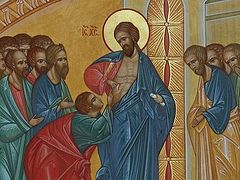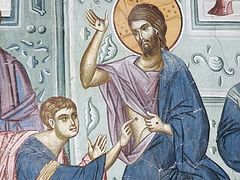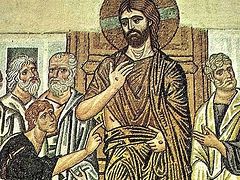Acts 5:12-20; John 20:19-31
Christ is Risen!
Today we continue to celebrate the glorious resurrection of our Lord, God, and Savior Jesus Christ on the third day. He is our Pascha, our Passover, from death to life, for Hades and the grave could not contain the God-Man Who shares with us His victory over death. He has made even the tomb a pathway to the glory of life eternal. As He said to Martha before He raised Lazarus, “I am the resurrection, and the life: he who believes in me, though he die, yet shall he live.” (John 11:25)
The Savior was able to rise in glory because He was born, lived, and died with a human body just like ours. When He rose from the dead, He did so as a whole person with a glorified body which still bore the wounds His crucifixion. Thomas doubted the news of the resurrection because he was not present when the Risen Lord first appeared to the disciples and said that he would not believe unless he saw and touched His wounds. When the Savior appeared again eight days later, He told Thomas to do precisely that. Thomas responded by recognizing Him as “My Lord and my God!”
This exchange with Thomas reminds us of the profound importance of Christ’s bodily resurrection to the Christian faith. Indeed, it is impossible to give a plausible account of the origins of the Christianity apart from the reality of the Lord’s rising from the dead. He certainly died on the Cross, as Roman centurions were professional executioners who knew what they were doing and would lose their own lives if they let a victim escape. The disciples fled in fear at the Lord’s arrest with Peter, the head disciple, denying Him three times. The women showed greater love and courage by going to the tomb in order to anoint Christ’s dead body. It is clear, however, that they all acted in response to His death and showed no hope of His resurrection. Remember that the idea that someone would rise from the dead was as outrageous, if not more so, in that time and place than it is in ours. No one associated being the Messiah with dying on a Cross and resurrecting. Since the apostles later died as witnesses to their belief in the Lord’s rising, it is absurd to say that they had concocted the story. Countless generations of martyrs have likewise made the ultimate testimony to the Lord’s victory over death with a strength and peace that are not of this world.
As St. Paul taught, “[I]f Christ has not been raised, our preaching is worthless, and so is your faith.” (1 Cor. 15:14) The Savior proclaimed His divinity by forgiving sins and saying that He and the Father are one (John 10:30) and that “before Abraham was, I am.” (John 8:58) The high priest asked Him at His arrest, “Are you the Messiah, the Son of the Blessed One?” Christ responded, “I am. And you will see the Son of Man sitting at the right hand of the Mighty One and coming on the clouds of heaven.” (Mark 14: 61-62) The Savior foretold His death and resurrection many times, though the disciples never got the point. If One Who claimed to be God was wrong in predicting His resurrection and simply decayed in the tomb like anyone else who died, the Christian faith would never have appeared. There would be no Church and no reason for anyone to remember Jesus Christ as anything but a failed Messiah with grandiose delusions about being divine.
Our faith is not in warm feelings or sentimental memories about someone who lived a long time ago. It is not in a vague notion of a dead person being with us in spirit or in the abiding relevance of ancient moral teachings for our lives. To proclaim that “Christ is Risen!” is to confess the reality of the God-Man’s victory over death as whole Person, of His bodily resurrection which is our hope for “the resurrection of the dead and the life of the world to come,” as we confess in the Nicene Creed. To quote Saint Paul again, “[I]if Christ has not been raised, your faith is futile; you are still in your sins. Then those also who have fallen asleep in Christ are lost. If only for this life we have hope in Christ, we are of all people most to be pitied.” (1 Cor. 15: 17-19) If Christ did not rise from the dead, then St. Paul was a fool for dying out of faithfulness to Him. He became a Christian only after the Risen Lord miraculously appeared to Him in blinding light on the road to Damascus It is impossible to make sense of this Pharisee who zealously persecuted Christians becoming one without belief in the reality of the Savior’s resurrection.
Hope for eternal life is not reserved only for the coming fullness of the Kingdom, but also concerns how we live in the world as we know it with our bodies and in relation to others. Having been empowered by the Risen Lord through the gift of the Holy Spirit, the apostles ministered by healing the suffering bodies of the sick as they bore witness to the restoration of the whole human person through His resurrection. Even the pagan critics of the early Christians marveled at how they risked their lives to care for people with contagious diseases during plagues. They rescued infants abandoned by their parents to death, slavery, or other terrible fates, which was a common practice among the Romans to dispose of children they did not want to raise. Instead of aborting unborn children in the womb, they welcomed them as neighbors to love and blessings from God. In a time when desperately poor people had no more dignity than so much garbage left on the side of the road, the early Christians shared their resources sacrificially with them. In a culture where a master could abuse the body of a slave literally however he chose, the Church knew that in Christ “There is neither Jew nor Gentile, neither slave nor free, nor is there male and female, for you are all one in Christ Jesus.” (Gal. 3:28)
The differences in the bodies of men and women remain, but Christians must treat everyone, regardless of sex or social standing, as someone who bears the dignity of a living icon of Christ. He was raised in the body and how we treat anyone’s body, including our own, is how we treat Him. St. Paul condemned the sexual immorality of the Corinthians by reminding them that, “By His power God raised the Lord from the dead, and He will raise us also. Do you not know that your bodies are members of Christ Himself?…Do you not know that your bodies are temples of the Holy Spirit, who is in you, whom you have received from God? You are not your own; you were bought at a price. Therefore honor God with your bodies.” (1 Cor. 6: 14-20) The same early generations of Christians that produced so many martyrs stood in stark contrast to the decadence of pagan society. Their example of chastity, through abstinence for singles and fidelity for husbands and wives in marriage, reflected both the holiness of the body as revealed through Christ’s resurrection and how He has delivered us from slavery to even the most deeply rooted self-centered desires.
Because “Christ is Risen!,” we must unite ourselves to Him in holiness in every dimension of our being, including especially how we live in our bodies. The more that we do so, the more that we will learn to see our neighbors, no matter who they are or what they believe, as persons called to find the fullness of their humanity in Him every bit as much as we are. The best witness that we can make to others is to become living proof of the healing and fulfillment that the Savior has brought to the world by offering His own Flesh and Blood. That is how He conquered Hades and the grave, and has restored fallen humanity to the sublime dignity of “partakers of the divine nature” through grace. Let us not, then, simply sing Christ’s resurrection, but become living icons of the holy joy He shares with us through His risen and glorified Body. Our faith makes no sense apart from the Savior’s rising from the tomb as a whole, embodied Person. Could the same be said of our lives? Let us bear witness to Christ, our Pascha, as we live and breathe in a world that desperately needs a sign of hope for liberation from darkness and despair, for Christ is Risen!





